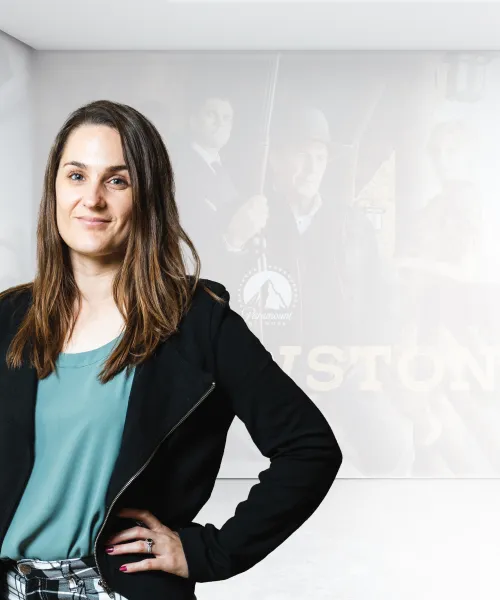
By Kristi Evans
A serendipitous encounter following a fender-bender started a cycle of career advancement opportunities that helped propel Stacy Milbourn '11 BS to her current position of script coordinator for television series such as Yellowstone, 1883, Mayor of Kingstown, Shadow and Bone and—most recently— The Recruit. While her primary focus is on fine-tuning the work of others, she continues to develop her own scripts and shop them around with the goal of becoming a staff writer on an existing show or, better yet, finding a producer for her own TV series.
Early 2016 was a challenging period. Milbourn learned that she would be laid off from the first industry job she landed after moving to Los Angeles: assistant to the executive producer at Hallmark Hall of Fame. The standalone production company was merging with the Hallmark Channel as part of Crown Media Holdings, with resulting cuts to its workforce. Milbourn was not overly concerned at first.
“They say if you get in at least a year as an assistant, you can get another job pretty easily,” she said. “But I had done 14 interviews with no luck and was down to my second-to-last day at work. On my way to the office, a woman rear-ended my car with hers. As we talked afterward, she thanked me for being calm and I sighed and said, ‘It’s been one of those weeks.’ She told me she had to fire her assistant that morning, and I mentioned I was getting let go from my executive assistant job the next day. She said, ‘No way. What a coincidence.’ I sent her my resume. It turned out her husband also went to Northern and she’s originally from Saginaw.”
After what proved to be a fortunate accident, Milbourn secured a job as post-production coordinator at Herzog and Company, creator of the Primetime Emmy Award-nominated “Decades Series” for CNN that covered the 1960s through the 2010s. She handled administrative duties, screened staff applications, secured equipment and ensured that program deliverables reached CNN.
Her boss left Herzog to work on The Good Place comedy series and, knowing Milbourn wanted to be a writer, invited her to migrate as well and become a post-production assistant. One of Milbourn’s multiple duties was scheduling actors, including stars Ted Danson and Kristen Bell, to record voice replacement dialogue in the studio and directing them on what to do. This would have been necessary when there was a distracting sound during filming—perhaps a plane flying by—or a line in the script that changed after the cameras stopped rolling. Milbourn later shifted to the role of writers’ room production assistant.
“It was invaluable being a fly on the wall in the writers’ room, where a bunch of writers sit together pitching story ideas and breaking the season before they begin the writing process,” she said. “They would start with a blank slate and use index cards to outline each episode. I’m not a comedy writer, but being in there was hilarious. I learned you need to get out of your comfort zone and not be afraid to present ideas or have some rejected.”
Through a friend, Milbourn learned of an opportunity to move up a level to a writers’ assistant for the third season of Yellowstone. She had stenographer-type responsibilities, taking notes on everything discussed in the writers’ room in case questions surfaced later, such as why it was decided that a particular idea wasn’t feasible.
When that job was ending, Milbourn’s bosses asked her to stay on as a script coordinator. That is the role she has held since 2019. She works as a freelancer contracted to specific shows rather than an employee of the companies producing them. Her duties involve proofreading and formatting scripts, getting clearance on what names are legally allowable to use, and catching continuity errors between episodes that would prevent the story from making sense. For example, if a character’s name changed from earlier, or a character who died back in episode 2 resurfaces in a later episode.

“The biggest part of my job is acting as a liaison between the writers and production team,” Milbourn explained. “There are 200 or more people on every film shoot. I have to send scripts to the entire cast and crew. When revisions are made, which happens a lot, I record those and send out updated scripts that let people know what changed. My job depends on other people and I spend a lot of time waiting around for writers to send a script. I’m basically on call 24/7. And I work remotely, which I don’t like.
“It helps that script coordinators have social media groups and different Slack accounts that allow us to keep in touch, arrange lunch meetings, offer moral support, ask for guidance, and recommend each other for jobs. Despite occasional drawbacks, I keep reminding myself that a girl from Ontonagon is lucky to be doing amazing things, and I wouldn’t want to work in any other industry.”
Milbourn’s desire to become a writer is rooted in her love of reading, which she started doing as a 4-year-old who was eager to keep pace with her older sister. Teachers complimented her short stories in elementary school. She wrote a play about pirates at 14 and Spanish-language short films for a high school class. A pivotal moment occurred when Milbourn saw the movie Pirates of the Caribbean, followed by a bonus featurette on screenwriters. “I said to myself, ‘Hold on, this is something I can do?!’ I was all in.”
When it came time to select a university, Milbourn chose Northern because she was impressed with the English Department’s creative writing and film studies programs.
“In Jen Howard’s class, there were rules about what we could and couldn’t write. No melodrama, no drug-induced fantasy sequences. Those rules were helpful in opening our minds and getting creative. She encouraged us to show and not tell, which was useful for writing for the screen.”
Professor Marek Haltoff’s film classes had a significant impact as well. When Milbourn later served as a teaching assistant while pursuing a master’s in screenwriting at Florida State University, she often referred back to Haltoff’s course syllabi. She also gained experience in producing live events, similar to on-set work, as president of Northern Arts and Entertainment at NMU. “I was getting an introduction to this world I’m in now without realizing it,” she said.
She moved to Los Angeles after graduate school with no job lined up and an apartment reserved only a few days in advance. Milbourn accepted an unpaid internship with a production company, reading scripts and writing reports on whether scripts should be developed into films or TV shows. That gig lasted a few months before she joined Hallmark Hall of Fame and started earning a paycheck.
As a script coordinator, Milbourn’s favorite project has been Shadow and Bone, mainly because she was a “massive fan” of the book series and watched the show regularly, despite seeing several incarnations of the script before each episode. She would like to be a TV writer in the hour-long genre, with a preference for sci-fi, fantasy, mystery and history programs. One of the original pilots she wrote revolved around a female World War II spy. She is currently developing an adaptation of Sara Foster’s novel, The Hush, to pitch as a series.
“Most meetings I’ve had so far about my own projects have ended with, ‘We love your writing, but it doesn’t fit into our slate, or it would be too expensive to produce,’” she said. But each rejection is an opportunity for Milbourn to establish new contacts and demonstrate what she can do in the hope that she will remain on the radar for future writing opportunities.
Fueled by her working knowledge of what makes a compelling story, Milbourn established a side business in script consulting and proofreading. She previously served as a freelance writer and researcher for the Spotify podcast Female Criminals, whose subjects included Bonnie Parker, Ulrike Meinhof, Kim Hyon-hui, Charlotte Corday and Patty Hearst.
Her Northern Magazine interview took place at a Burbank hotel, about a week before the Writers Guild of America went on strike. Though not a WGA member, Milbourn is directly impacted and supports the cause. She says the growth of streaming platforms has led to smaller TV series writing staffs, shorter contract periods with fewer episodes per season, and less residual revenue when writers’ material is reused. In a May 18 update, she wrote, “Work is essentially non-existent. My own pitching/ meetings are on hold per strike rules, but I’ve been out picketing almost every day and meeting other writers.”
Milbourn’s career ascent serves as proof that while serendipity and connections can be helpful in the entertainment industry, staying power is determined more by what you know—not who— and how hard you’re willing to work.
“It’s all about reputation—not only for doing a good job, but being the type of person others can trust and want to be around for many hours. You want to stand out so you’ll get the chance to work with a company again or be highly recommended for new opportunities. It’s important not to burn bridges. I’m not where I want to be in this business yet, but I’m getting there.”